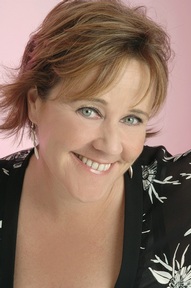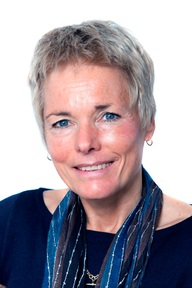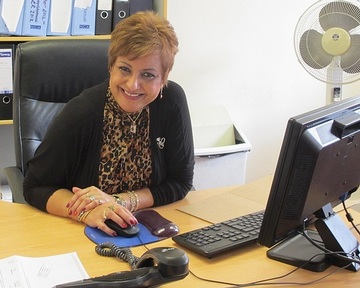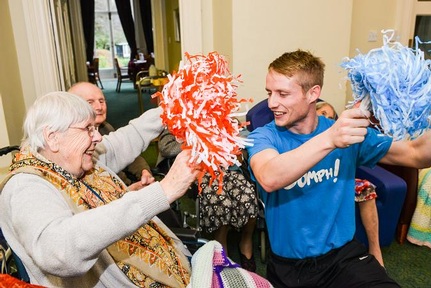Care homes urged to prioritize activities to prevent residents going into shutdown mode
Sylvie Silver, director of the National Association for the Providers of Activities for Older People, has been battling for nearly a decade to get more care homes to put activities at the heart of their care.

“At NAPA, the ethos is that activities should be seen as very much integral to care and not an extra. We support care homes to enable residents to live life the way they choose with meaning and purpose,” she says.
She has found that during the eight years she has worked at NAPA, “things are improving and there has been a steady change and a recognition of the value and benefits of activities in care homes. Activities are now high on the agenda now for many care homes”.
However there is still a lot of work to be done as a recent report called ‘Low Expectations from the Alzheimer’s Society revealed when it found just under half of relatives (44 per cent) said opportunities for activities in their relatives' care home were good.
Meaningful activity is invaluable as it “affects the wellbeing of residents and research has shown that if your wellbeing is good, you will cope better with the challenges of ageing. People become depressed more if their wellbeing is low. It makes sense for care homes to have residents who are motivated.”
Ms Silver visits many care homes where “the care of the residents is great but if you look at their lifestyles these are ignored and if it was me, I know I would be climbing the walls. If people are not motivated, they can get institutionalised very quickly and go into shut down mode”.
She believes part of the problem as to why activities are not at the core of all care homes lies in the job description of care home staff.
“Care staff are generally seen as pure care deliverers. But it should be more about supporting people rather than meeting personal care needs. Delivering activities should not just be up to the activity coordinator. The problem is that it is often seen as just their responsibility and they are often asked by the other care staff ‘what are you going to do with the residents today’.”
Ms Silver says: “We need to skill up the whole care workforce so they recognise that activities are integral to person centred care which is what residents should be receiving.”
It is also down to perceptions which need to be challenged as many care workers think activities are a group event.
The all too familiar routine of a care home is that carers will get the residents up, wash and dress them and put them in the lounge.

“They will often put them in front of the TV which I call the carer’s babysitter. I was in a care home recently and residents were sitting in the lounge watching Jeremy Kyle on the television where two men were shouting at each other. I looked at one of the women watching it and she looked very confused and distressed. I would like managers and carers to turn the TV off for a while and see what difference it makes to conversation and engagement.”
“There needs to be a lot more done in terms of training.” In a drive to achieve this, NAPA has devised its own training course - the level 2 Award in Supporting Activity Provision in Social Care (QCF). Ms Silver would like to see this to be a minimum standard of training for all care home staff.
She concedes there are some care homes doing an excellent job in putting activities at the centre of their care, citing the likes of Greensleeves Homes Trust, Signature Care Homes and Pendine Park Care Homes.
But NAPA wants this to be the case across all care homes and with the CQC now requiring care homes to meet the individual needs of each resident, Ms Silver hopes this will one day be the case.
“It is no longer good enough to say this is the programme, come along if you fancy it.”
Care homes need to “start with the individual and look at their lifestyle and identify how they would choose to spend their day. It might involve listening to Radio 4, going to the dining room and sitting in the garden after lunch. It doesn’t have to be a group activity.
“By asking what people enjoy doing, you may find you have a group of people who enjoy quizzes and you can put on an evening quiz for them. The problem is you often have homes who say this is what we offer instead of putting on things in response to what people want. This is a huge cultural change for many care homes.”
Over the next few years, NAPA is planning to grow its membership among care homes and “get the word out there even more about the importance of activities in care”.
Interesting facts
First job: Nursing auxillary
Favourite book: One Flew Over the Cuckoo Nest by Ken Kesey
Favourite film: Butch Cassidy and the Sundance Kid
Favourite piece of music: ‘The Planets’ by Gustav Holst and ‘Hotel California’ by The Eagles
What is the best present you have received: A flight in a hot air balloon
Last holiday: Spain
Latest Profiles News
 05-Sep-16
Being chief executive of a care home provider is a 'huge responsibility and privilege'
05-Sep-16
Being chief executive of a care home provider is a 'huge responsibility and privilege'
 31-Mar-15
Profile: 'Both local and national Government needs to put its money where its mouth is,' says chair of the National Care Association
31-Mar-15
Profile: 'Both local and national Government needs to put its money where its mouth is,' says chair of the National Care Association
 16-Dec-14
Profile: Care home turnaround specialist reveals some of the tricks of the trade
16-Dec-14
Profile: Care home turnaround specialist reveals some of the tricks of the trade
 01-Dec-14
Profile: ‘People should not be dreading going into a care home – they should be looking forward to it,’ says care home boss
01-Dec-14
Profile: ‘People should not be dreading going into a care home – they should be looking forward to it,’ says care home boss
 07-Oct-14
Exercise is key to 'changing the care sector' says provider of exercise therapy in care homes
07-Oct-14
Exercise is key to 'changing the care sector' says provider of exercise therapy in care homes